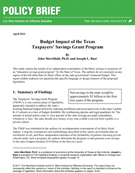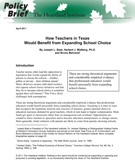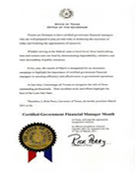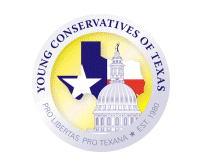Taxpayer savings grants are a win-win for both students and Texas taxpayers saving the state $2 Billion over the next two years. Every student is unique with different interests, abilities and educational needs. Providing parents voluntary options in education benefits students, the state budget, the Texas economy, and Texas taxpayers. This voluntary program decreases school expenses to help cover our school budget shortfalls thereby leaving more money on a per student basis in the system. Read More
Texas's School-Reform Opening
Texas is going through a painful reduction of state aid to local schools, but an innovative proposal could solve the problem without hiking up taxes.
By JOHN FUND
Texas is going through a painful reduction of state aid to local schools, the result of the recession and plunging revenues. The state will be cutting the amount it spends per student by 5% to 11%, forcing some schools to end pre-kindergarten programs, technology purchases and mentoring programs. But there is a possible solution that doesn't involve hiking job-killing taxes. Half of the cuts could be made up by an innovative proposal that is before the Texas legislature right now.
It's called the Taxpayers' Savings Grant, and it would provide grants of up to $5,143 or the cost of private school tuition, whichever is less, for every Texas child who moved from a public school to a private school. Those eligible would be parents whose children are entering either kindergarten or first grade, and those with kids who have been in public schools for at least one year. The plan has significant support from state legislators and some school principals.
According to the Heartland Institute, one of the groups that developed the plan, the state would save about $3,429 every time a child is transferred. If, as expected, 350,000 students transfer to private schools, the state would save more than $2 billion over the next two years. Whatever money the state saved would stay with the local schools to help alleviate the cuts they face.
Teacher unions are howling that the proposal would privatize public education, but in reality it would simply give parents more choices. Politically, the plan's fate lies with Republican Gov. Rick Perry and Lt. Gov. David Dewhurst, who presides over the Texas State Senate.
Mr. Perry captured 41% of the Hispanic vote in his re-election victory last year, and he may want to seize on the plan to push a statewide political realignment. The worst performing schools in the states are often primarily Hispanic, and allowing parents in those schools to send their children to a Catholic school could be enormously popular politically.
As for Mr. Dewhurst, he is a likely candidate for U.S. Senate and anxious to prove his conservative bona fides in a crowded primary field. He could score major points for pushing a bold school-choice plan or be the brunt of political attacks if he fails to spend any political capital on the idea at a time when public school programs are being cut back.
Texas's budget crunch is an opportunity for bold school reform. The open question is whether the state will seize it.
To read more stories like this one, please subscribe to Political Diary.









